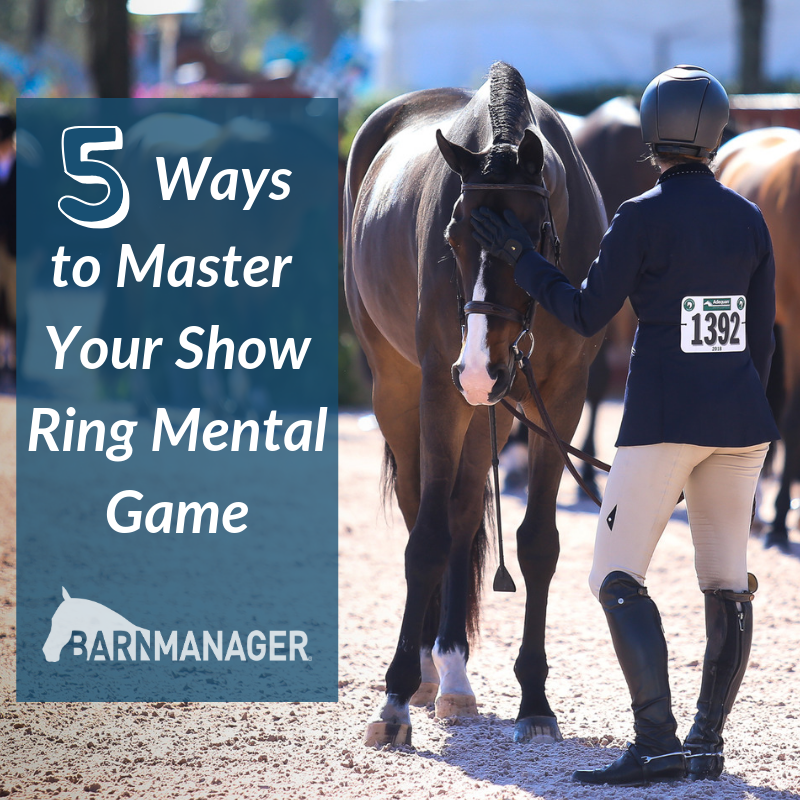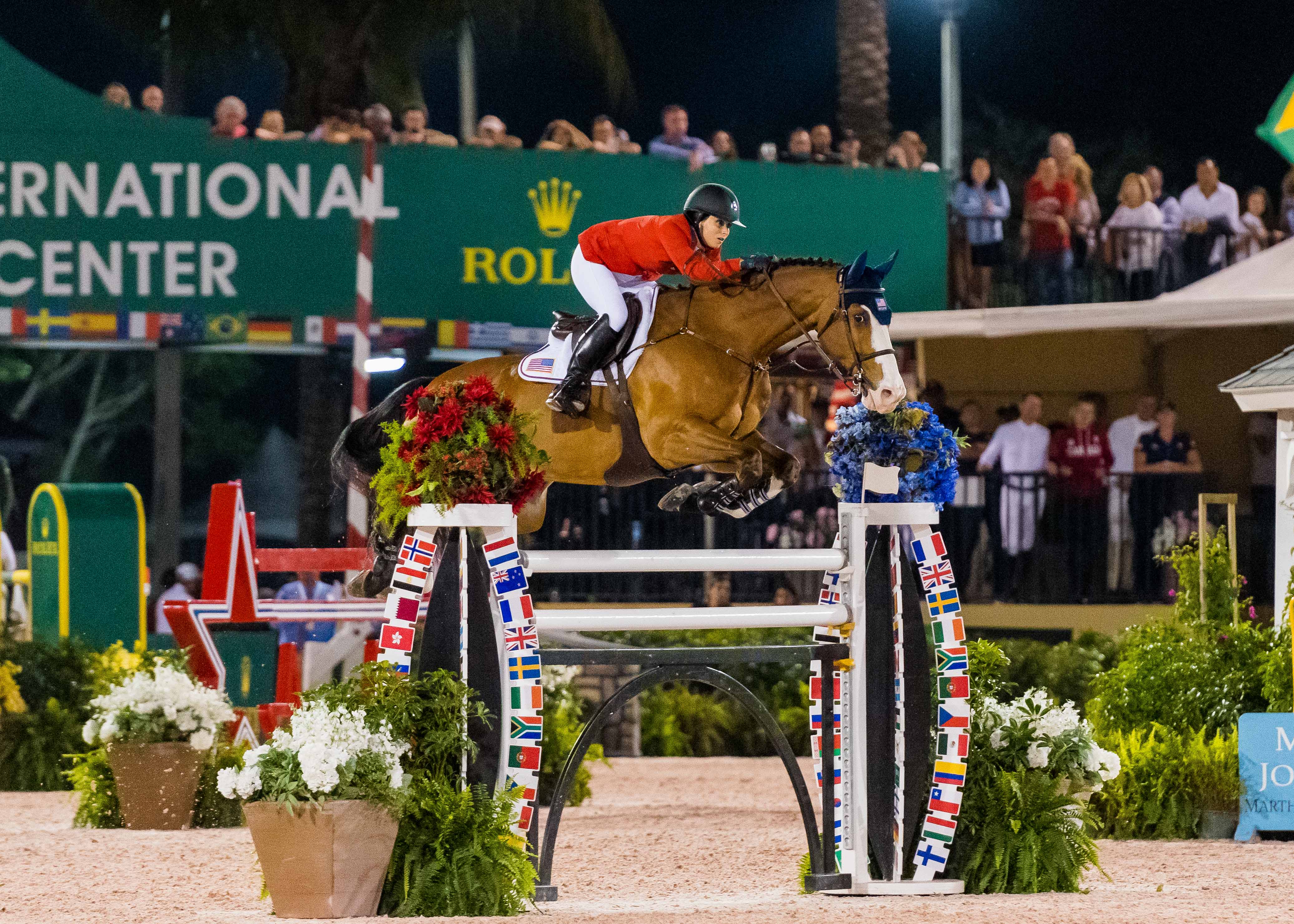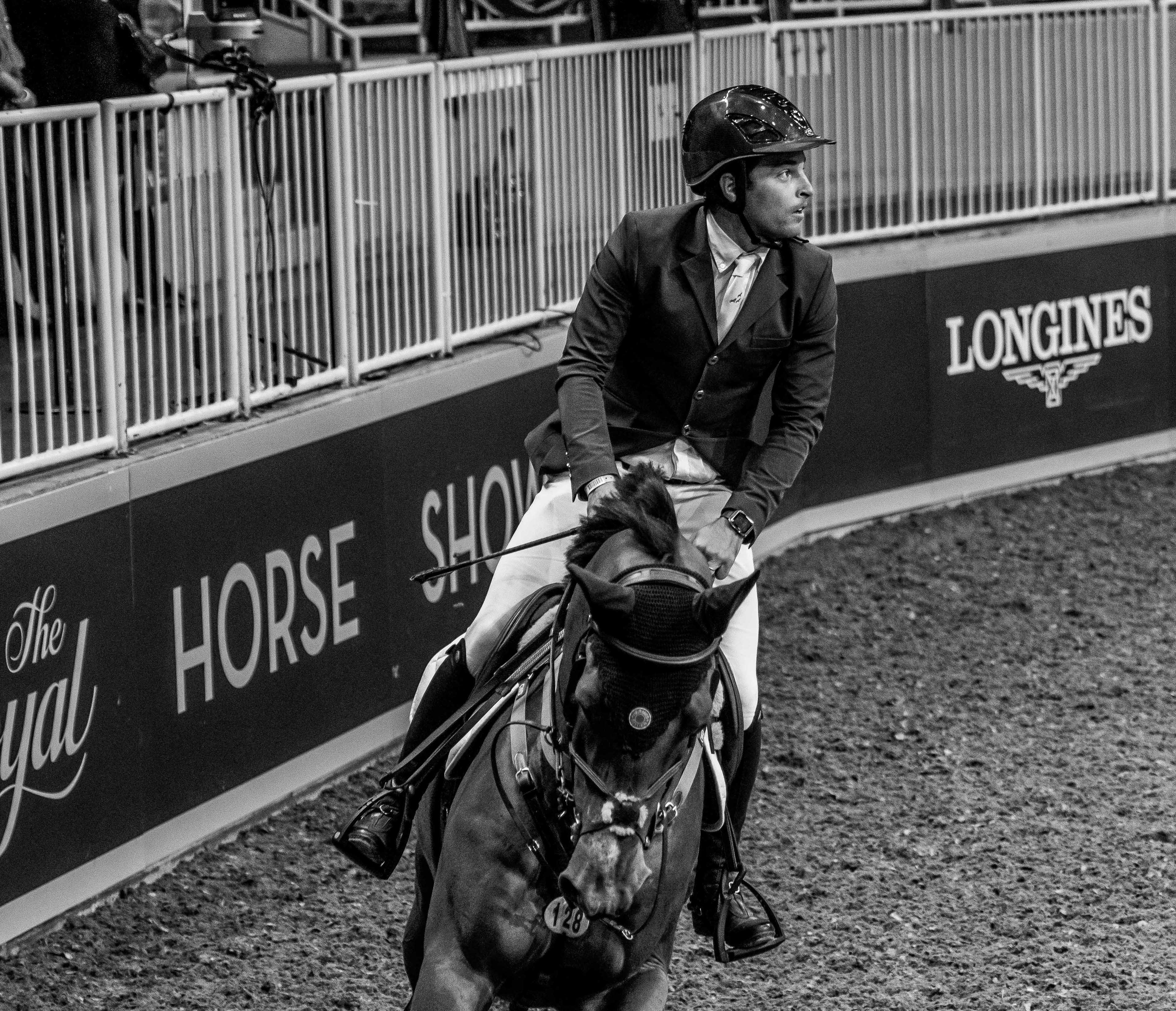-
Pingback: Six Ways to Reduce Horse Show Stress

Five Ways to Master Your Show Ring Mental Game
Whether you’re about to jump a grand prix, ride a dressage test, enter a western pleasure class, or complete a 2’ hunter course, there’s a good chance that you know the feeling: that bundle of nerves or anxieties that leaves you sick to your stomach or tense in the saddle.
Or, maybe you’re as cool as a cucumber going into the show ring, but it’s after the class when a mistake has been made that the mental game gets the best of you, as you overanalyze and continuously critique yourself for the error. Or perhaps you find yourself struggling right in the middle of the class, with your mind wandering off to something that happened earlier in the day instead of focusing on the task at hand.
No matter what the particular struggle may be, equestrians everywhere are becoming increasingly aware and open about the importance of managing the psychological component of the sport. We’ve gathered five tips from top riders that could help you do just that!
1. Develop a routine.

Adrienne Sternlicht frequently listens to books as part of her pre-class routine. Photo by Jump Media
There are countless articles online about the benefits of a morning routine for productivity and performance, and the same can hold true when it comes to a show-ring ritual!
Show jumper Adrienne Sternlicht frequently listens to books (including chapters titled “Fear” and “Desire” in the book Letting Go: The Pathway of Surrender by David R. Hawkins, M.D., Ph.D) as part of her pre-class routine, and that helped bring her a sense of calm before helping team USA earn gold at the FEI World Equestrian Games Tryon (WEG).
“All that routine does is bring comfort to uncomfortable situations,” said Adrienne. “I was so freaked out the first day at the [WEG]! I had no idea what to expect. I found comfort in being able to a) meditate and b) listen to books.”
Fellow show jumper Daniel Bluman says, “Routine is the most important thing that I think any athlete can go back to.”
Whether it’s taking a walk, meditating, napping, reading a book, grooming your horse, or polishing your boots, find a set of habits or rhythms that you enjoy and that help bring you to a place of calm and familiarity. They can help prevent you from anxiously having to overthink what to do next before you ride.
2. Know what works for you, and don’t be ashamed of it.
Once you find your routine, don’t be embarrassed or ashamed to stick to it even if it doesn’t make sense to those around you.
For instance, while Adrienne prefers to keep busy or immerse herself in meditation or audio books and couldn’t imagine sleeping, Daniel can often be found napping by the grand prix ring prior to his round, and Olympic dressage rider Kasey Perry-Glass likes to keep things light.
“I was talking to a sports psychologist, and she asked me to think back to the best ride that I’ve done and what I did to prepare for that best ride,” explained Kasey. “I said, ‘I think I was laughing in the barn and having fun.’ Sometimes we think we have to be so serious and not crack a smile, especially for these team events. It has to be so focused, but sometimes focus comes in many forms. Luckily, I have teammates that love to joke around with me. The lighter I keep things the better I am in my head. Another girl on my team, loves to sleep; we have to wake her up. So, it’s interesting how everyone can be so different.”
Laura Graves, the number two-ranked dressage rider in the world says: “I think it’s important to learn how you succeed: how you recharge, what drains you, and really how much you can tolerate.”
3. Recognize that you are not alone in your struggles.
Even Olympic riders and top professionals are speaking out more and more about their own fears, anxieties, and difficulties in mastering the psychological side of the sport.
Kasey recently shared, “Leading up to the Rio Olympics, my horse got overfloated with his teeth. He wouldn’t eat; it was just horrible. After Rio, I went through a pretty big depression. At the end of 2017, I took a big break and started talking to a sports psychologist, just getting my mind right again. [That incident before Rio] took the fun out of riding. Mentally, I just was not prepared for getting shot up into the high-performance world and then having all these things happen to me and not knowing how to deal with them. So, I think it’s really important to learn to be mentally strong. I think it’s important to stay true to yourself and take care of yourself and your mind.
“Even these big events that you go to, I try to think of it as a very small thing,” continued Kasey of her routine now. “Because if it becomes too big in my head, it becomes overpowering. Then I can’t focus. Two hours before I start my preparation, I feel sick to my stomach. I’m not nervous; I’m just anxious. Once I start braiding and getting him tacked up and all of that, it goes away. Then after my warm-up I feel pretty secure. I trust my training; I trust my coach, and she sends me in having full confidence.”
For Daniel, a two-time Olympian himself, the struggle often comes in overthinking his last ride.
“I do definitely dwell on mistakes. It’s a constant battle. To say that after the competition I’m not angry if I had a rail down, that would be a total lie,” Daniel says.
4. Try to avoid dwelling on mistakes or thinking about what could go wrong.

Daniel Bluman may glance a look back at the clock (pictured), but he is continuously striving to not spend excess time looking back at past show ring mistakes. Photo by Jump Media
Easier said than done, but by proactively and consciously striving to let go of mistakes and to focus on the positive scenarios, you are more likely to set yourself up for success.
“We compete a lot; we are all the time doing this, so [not dwelling] is something that I’ve tried to master through the years,” said Daniel. “Constantly, every competition, every week, I try to be better and to dwell the least amount of time possible. I just go back, see what I did wrong, how am I going to correct it, and that’s it. If I keep dwelling on it, then I start affecting the people that love me.
“People don’t want to be around you when you’re in a bad energy all the time,” continued Daniel. “It’s important to bounce back from it. I know people say, ‘Ah look how seriously he or she takes it. He’s been upset going to the gym 10 times a day because he lost that class.’ I don’t think that makes you better or worse. There needs to be a balance between work and sport, especially in our industry where we compete until our 60s. If we’re going to take it that seriously, then we’re going to be dwelling from the time that we lost until the time that we win, we’re going to spend most of the year dwelling!”
Adrienne says, “‘I don’t mind what happens.’ – I love that phrase. It’s sort of a yogi phase, and I love yoga. It’s a sort of ‘I will still be here tomorrow’ mentality. That’s the nature of my program also. With [Adrienne’s trainer, Olympian McLain Ward], he’s very much of the mindset, ‘okay, tomorrow we’re still going to come back regardless of what happens, and work together, and we will also come back to address whatever those issues are and fall back on our program and move forward.’”
5. Remember why you are doing the sport in the first place.
We have shared this quote from Daniel on both our BarnManager social media and blog before, but it is one that will continuously hold true:
“I try to focus on the reasons why I do the sport. I didn’t start riding because I wanted to win a five-star grand prix anywhere in the world. I didn’t even know that five-star grand prix existed. I didn’t start riding because I wanted to be the most successful rider in the history of the sport; I really just started riding because I loved horses. In times when I’m really anxious or I feel my head is getting ahead of me, I just really try to remember that thankfully we work with horses and not with motorcycles or with cars. We work with actual animals that have this incredible power to give us that feeling of calm of peace.”
Have your own show ring mental strategies? We’d love to hear them in the comments below!
Photos by Jump Media